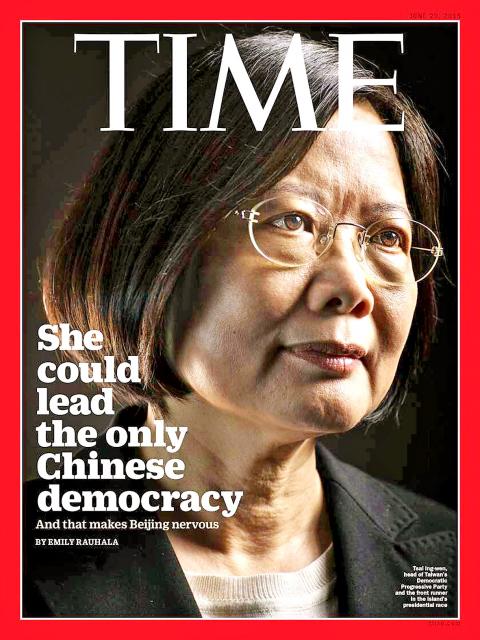The latest Asia edition of Time magazine is to print an interview with Democratic Progressive Party (DPP) Chairperson Tsai Ing-wen (蔡英文) — with the cover to feature her photograph — introducing her political background, while portraying her as a confident politician with a sense of humor.
“My purpose in giving the interview was to allow the international community to understand Taiwanese determination to defend values of democracy, and I’m glad that Time chose to make it a cover story and speak so much about the nation’s democratic development,” Tsai said on the sidelines of a campaign event in New Taipei City. “During the interview, I specially reminded the international community to pay attention to recent developments in Taiwan, especially after the Sunflower movement last year. Society now has a different expectation of the future.”
With the headline: “She could lead the only Chinese [sic] democracy,” a Time subheadline is to say: “That could make Beijing nervous.”

Photo: CNA
Tsai said it is a shared responsibility across the Taiwan Strait to maintain peace and stability.
“We want the international community to understand that it is everyone’s shared responsibility to maintain peace and stability,” Tsai said. “We especially stressed the DPP’s determination to maintain cross-strait peace and stability, and we hope everyone will work together to enhance stability and peace across the Taiwan Strait.”
In the interview, Tsai said that she would try to maintain the cross-strait “status quo,” while putting “Taiwan’s economy, development and culture first” in her policy platforms if elected.
She said that her policies would be Taiwan-centric, as opposed to President Ma Ying-jeou’s (馬英九) focus on pushing for new trade and tourism pacts with China.
The report said Tsai was “vague” on the independence-unification issue, as it was not made clear whether the DPP would repeal its stance on independence. On the issue of unificaiton, Tsai said: “It is something you have to resolve democratically — it is a decision to be made by the people.”
The interview said Tsai expressed confidence over her election chances.
Emily Rauhala, a Time reporter in Beijing who penned the article, said that Tsai offered her the last piece of tuna while they were at a Taiwanese-Japanese fusion restaurant in Kaohsiung and said: “Go back to Beijing and tell them you were served by the next president of Taiwan.”
“Tsai is quietly confident that she will gain the trust of Taiwan’s voters and secure victory, whatever Beijing might think,” Rauhala said.

RESILIENCE: Deepening bilateral cooperation would extend the peace sustained over the 45 years since the Taiwan Relations Act, Greene said Taiwan-US relations are built on deep economic ties and shared values, American Institute in Taiwan (AIT) Director Raymond Greene said yesterday, adding that strengthening supply chain security in critical industries, enhancing societal resilience through cooperation and deepening partnerships are key to ensuring peace and stability for Taiwan in the years ahead. Greene made the remarks at the National Security Youth Forum, organized by National Taiwan University’s National Security and Strategy Studies Institution in Taipei. In his address in Mandarin Chinese, Greene said the Taiwan-US relationship is built on deep economic ties and shared interests, and grows stronger through the enduring friendship between

GAINING STEAM: The scheme initially failed to gather much attention, with only 188 cards issued in its first year, but gained popularity amid the COVID-19 pandemic Applications for the Employment Gold Card have increased in the past few years, with the card having been issued to a total of 13,191 people from 101 countries since its introduction in 2018, the National Development Council (NDC) said yesterday. Those who have received the card have included celebrities, such as former NBA star Dwight Howard and Australian-South Korean cheerleader Dahye Lee, the NDC said. The four-in-one Employment Gold Card combines a work permit, resident visa, Alien Resident Certificate (ARC) and re-entry permit. It was first introduced in February 2018 through the Act Governing Recruitment and Employment of Foreign Professionals (外國專業人才延攬及雇用法),

The Ministry of Transportation and Communications yesterday said that it would redesign the written portion of the driver’s license exam to make it more rigorous. “We hope that the exam can assess drivers’ understanding of traffic rules, particularly those who take the driver’s license test for the first time. In the past, drivers only needed to cram a book of test questions to pass the written exam,” Minister of Transportation and Communications Chen Shih-kai (陳世凱) told a news conference at the Taoyuan Motor Vehicle Office. “In the future, they would not be able to pass the test unless they study traffic regulations

EUROPEAN TARGETS: The planned Munich center would support TSMC’s European customers to design high-performance, energy-efficient chips, an executive said Taiwan Semiconductor Manufacturing Co (TSMC, 台積電), the world’s largest contract chipmaker, yesterday said that it plans to launch a new research-and-development (R&D) center in Munich, Germany, next quarter to assist customers with chip design. TSMC Europe president Paul de Bot made the announcement during a technology symposium in Amsterdam on Tuesday, the chipmaker said. The new Munich center would be the firm’s first chip designing center in Europe, it said. The chipmaker has set up a major R&D center at its base of operations in Hsinchu and plans to create a new one in the US to provide services for major US customers,